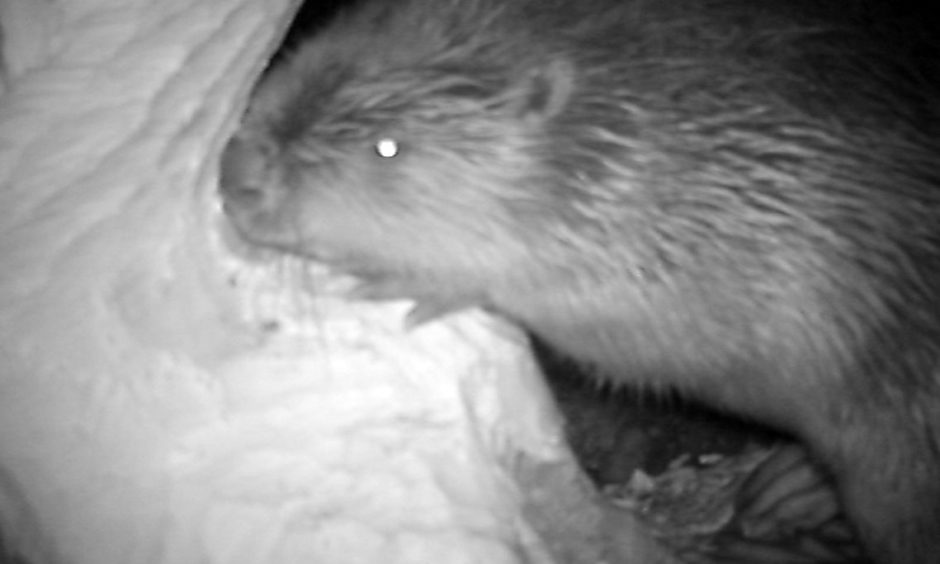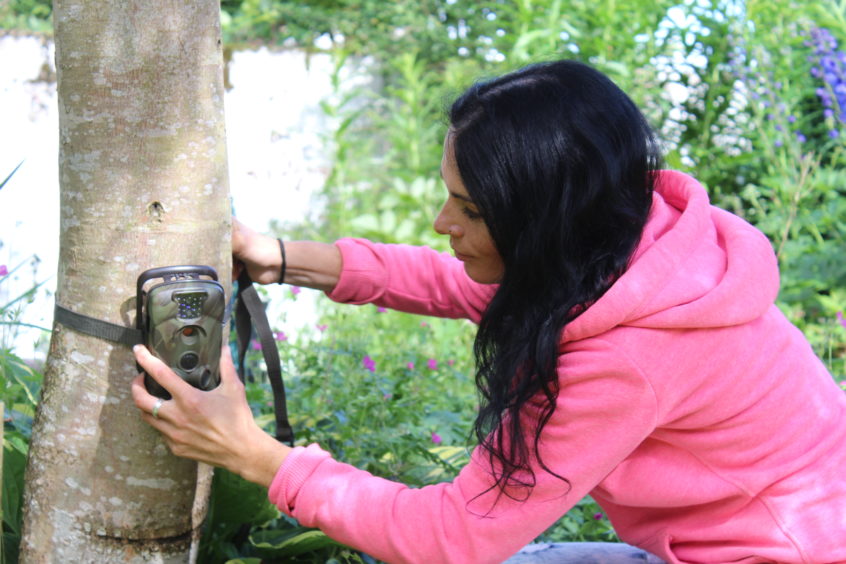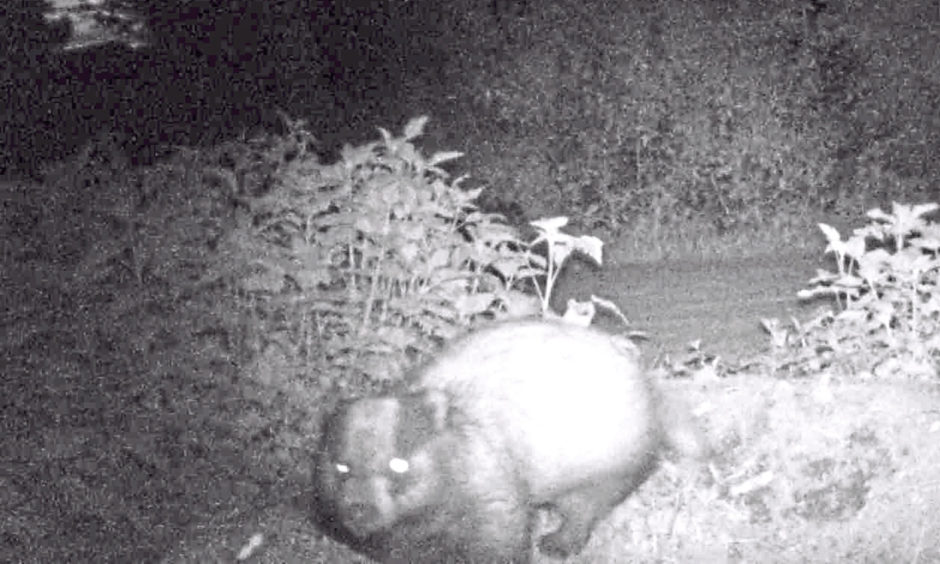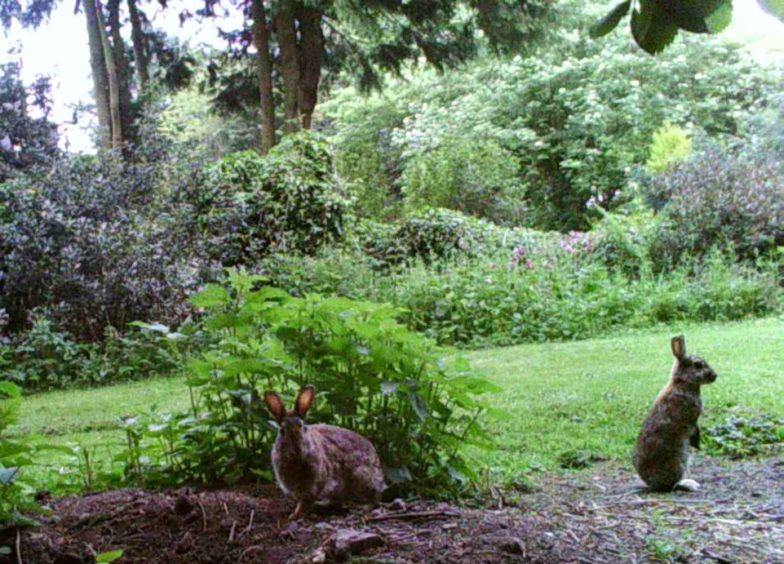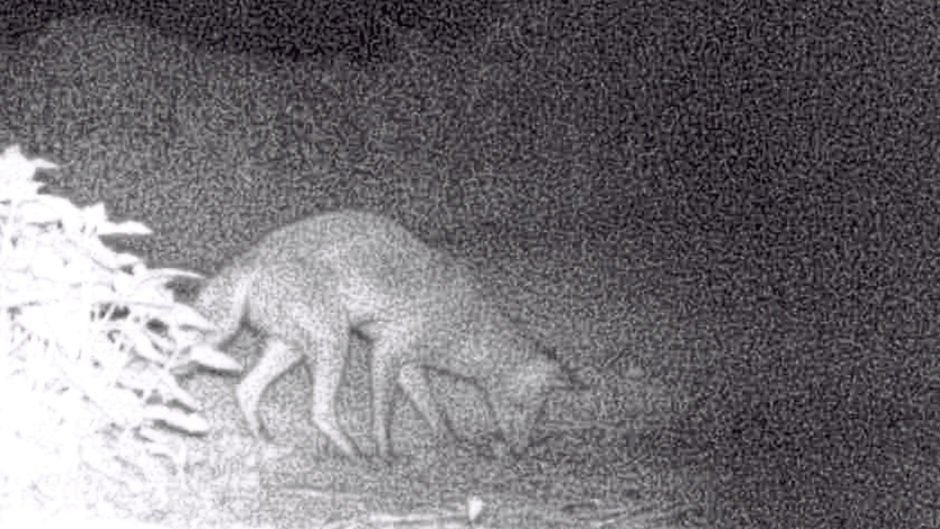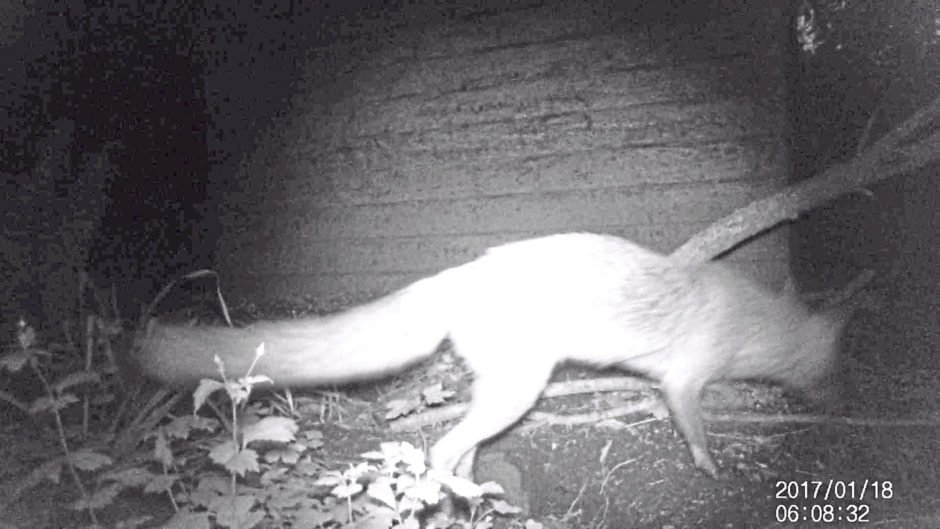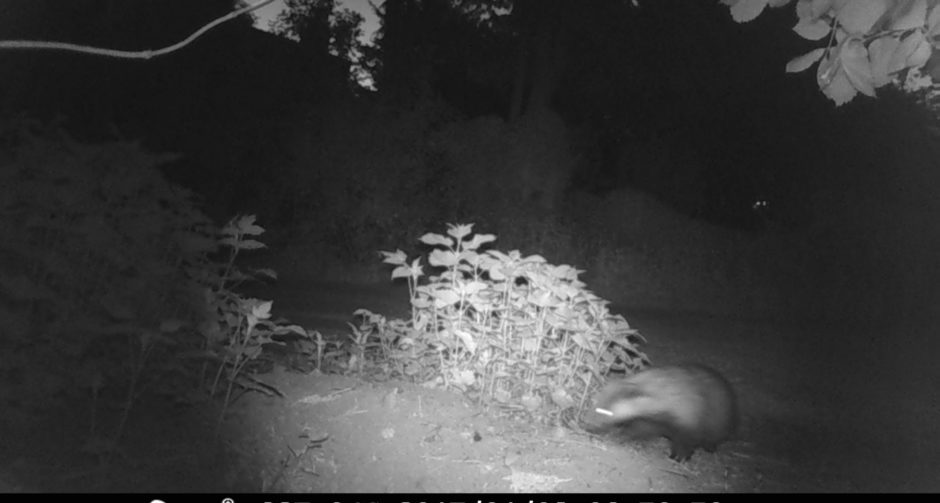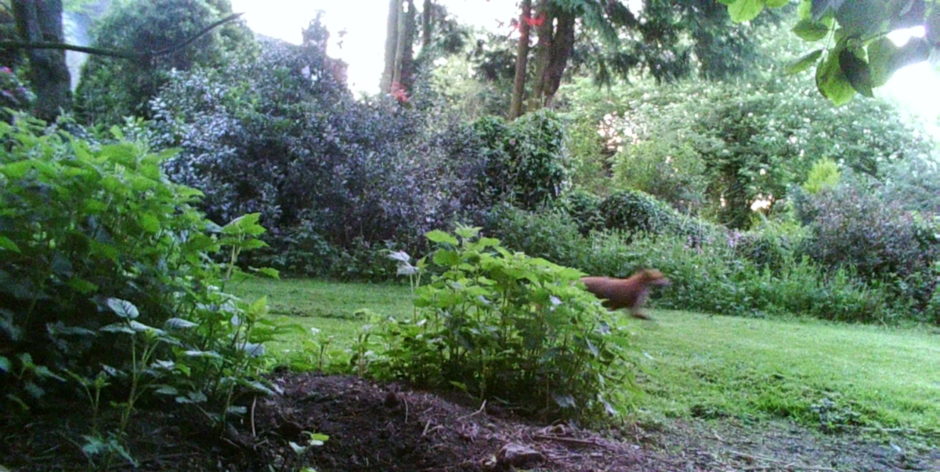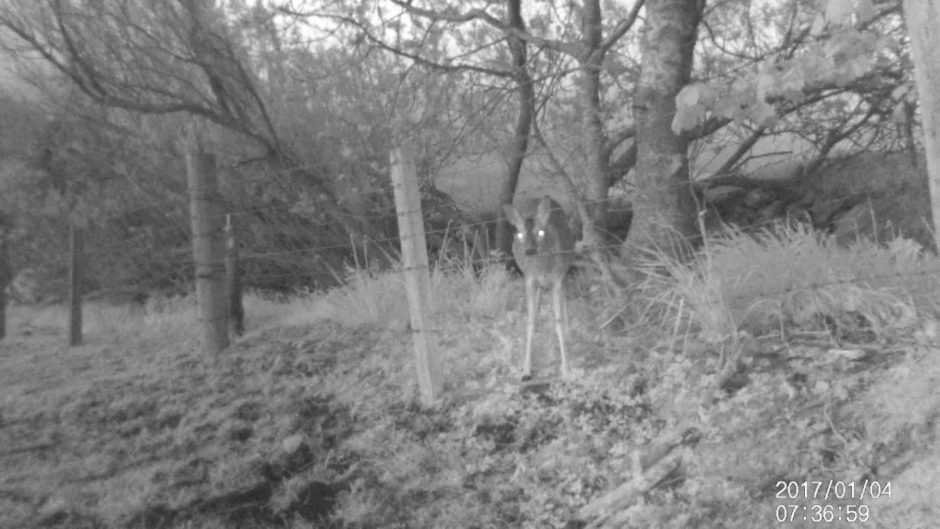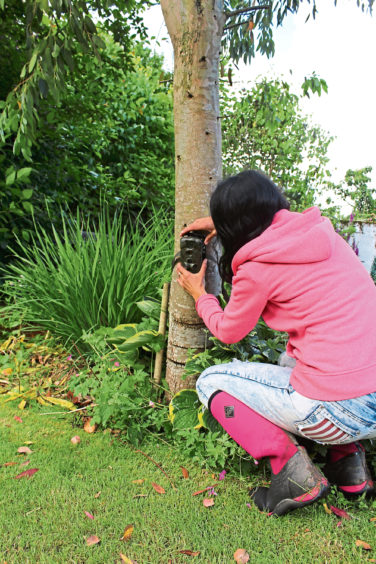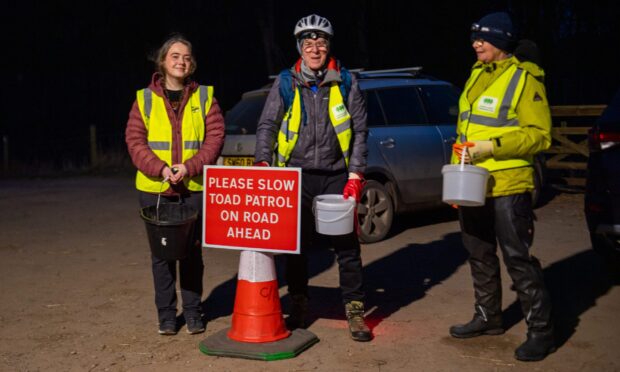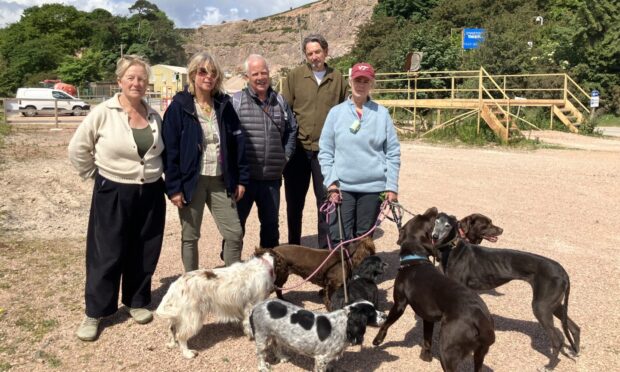Gayle buys a trail camera and gets some fantastic footage of animals that forage and snuffle in the dark…
It once stood proudly on the banks of the Kerbet Burn in Angus but the willow tree was shrinking on a daily basis. First, I spotted gnaw marks and wood chippings scattered at the base, and then a huge gouge was ripped out of the trunk.
I suspected this was the work of beavers, regarded by some as “nature’s architects”, and that ultimately the tree would be felled.
As it threatened to buckle, I decided to get video evidence of the creature, or creatures, responsible.
I bought a camera trap, also known as a trail cam, attached it to a fence post and waited patiently.
I didn’t have long to wait. After just one night, I had not just one, but five clips of a bold beaver attacking the tree.
He (or she) even sneezed violently in one video!
Having come up trumps in a surprisingly short space of time, I was ecstatic, and became completely obsessed by “catching creatures” on camera.
Alas, my trail cam bit the dust soon after I’d purchased it in 2016 and so I put this obsession to the back of my mind.
However, having noticed an abundance of burrows, tunnels and holes in my garden and woodlands nearby, I decided lockdown was the right time to purchase a new model.
Back in 2016, I’d bought my Acorn trail cam for £120, but I was able to pick up an Apeman model now for just over £50.
It was after 8pm before I got round to erecting it, and I was worried my scent might put off potential passersby.
Nevertheless, I tied the camera to a scraggly tree facing the entrance of a huge burrow with loads of spoil in front of it and kept my fingers crossed.
To my amazement, I discovered 17 clips of footage the following morning…with one featuring a badger.
The impressive black and white beast lumbered directly towards the camera, his shiny nose twitching as he passed.
I watched the clip again and again while grinning like a village idiot. Ah, simple pleasures.
The fact was, I’d hoped such a creature might deign to visit my garden, but here was living proof.
The other clips were slightly less exciting – of rabbits frolicking and nibbling on plants – something I’m accustomed to seeing as the garden is overrun with the fluffy creatures.
Over the next few days, I experimented by putting the camera different places – behind the summerhouse, on the lawn, in front of another burrow entrance and in dense woodland.
There was always some footage, whether of crows feeding their young, pigeons carrying sticks, puff-chested pheasants strutting their stuff, baby bunnies hopping around with their pals, or blackbirds pecking at the ground.
But I almost burst with excitement when the camera managed to capture two foxes and a cub, albeit on separate occasions.
Sadly, the footage of the cub is dismal, but its cheeky wee face pops into the frame for a second or so.
One of the adult foxes was rather a sorry sight – skinny, thin-tailed and walking with a limp. Poor thing.
The other one was a picture of health, its bushy tail trailing behind it resplendently as it slunk past.
The badger also made a second and third appearance although, of course, it might have been a different fellow.
On one occasion, his nose was pinned to the ground, presumably because he was grubbing for worms or rabbit poo.
I also caught a tiny roe deer chomping on leaves, while another highlight was a slinky but unidentified creature scurrying past so rapidly that all I could detect was a blur. Perhaps it was a stoat or a weasel.
There was also footage of my camera being rocked back and forth rather violently, accompanied by a snuffling noise.
Could it have been a curious fox cub, or the badger using it as a scratching post? I’ll never know.
Call me a weirdo, but each time I put up my trail cam, I’m like a child on Christmas Eve – full of anticipation and desperate to open my presents.
As the weeks have progressed, there’ve been some disappointments – whether the camera has been triggered by leaves fluttering in the wind, or a swarm of midges, and nothing much else.
But overall, I’ve been amazed and awestruck by the footage my new toy has yielded.
Ultimately, trail cameras allow you to view the secret world of wildlife on your doorstep and offer an incredible insight into the behaviour of seldom-seen nocturnal animals.
They operate via infra-red technology that detects movement through changes in heat, such as that caused by a passing animal.
Courier nature writer Keith Broomfield is a big fan of the devices, and says he has learned more about the behaviour of his local foxes and badgers via trail cameras than he has ever done when out watching them in person.
“Trail cameras also mean there is no danger of disturbing animals,” he says.
“I like to be imaginative when using my cameras and have frequently placed them by my local river only a few inches above the water to study the behaviour of otters and beavers.
“This is not without its risks though. I lost a couple of cameras last year when the river suddenly rose after heavy rainfall.”
Bear that in mind, folks, should you buy one!
info
Keith Broomfield’s top tips
- Become knowledgeable about animal signs, especially trails. Badgers and roe deer create distinctive paths through woods, and gaps under fences are often used by animals.
- Never place a camera pointing perpendicularly across an animal trail – have it directed along it, so it can pick up the creature as it approaches, giving more opportunity for a longer piece of film.
- Many cameras allow you to see a preview image so that you can be sure the camera is pointing in the right position. This is important, as there is nothing more annoying when you only get a partial film of an animal. You can also use a straight stick and line it up with the lens as an indicator to make sure the camera is pointing in the right direction.
- Trail cameras have both video and still photo options, or both can be used at the same time. I prefer just to use the video option.
- Use bait. Peanuts placed on a tree trunk are a great way of attracting squirrels, jays and other creatures.
